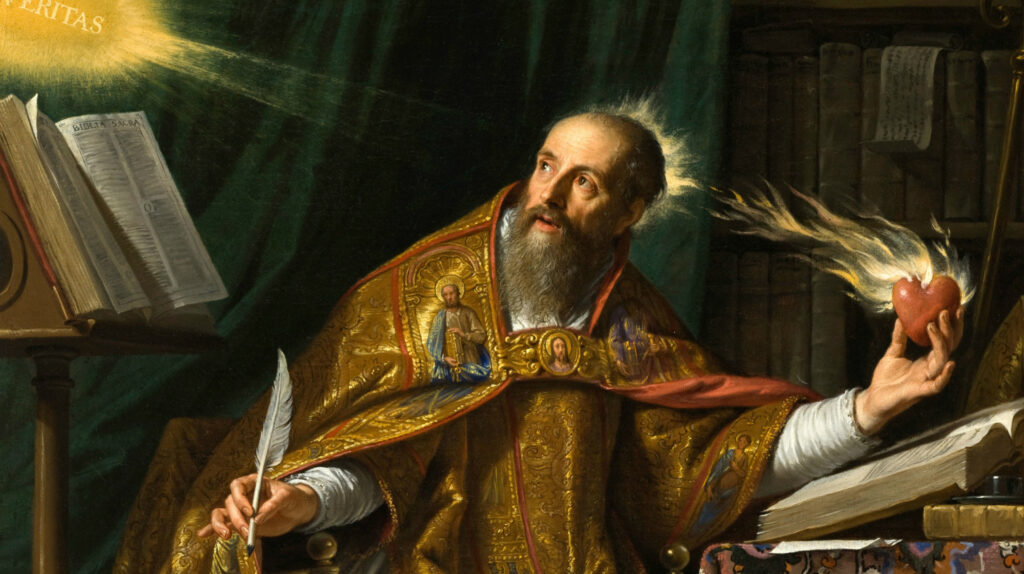354-430
Feast day: Aug. 28
The early Church Father St. Augustine has been regarded for centuries as one of the most important teachers of the Faith. This has remained true through the centuries, including in the documents of the Second Vatican Council, in which he was the most-quoted nonscriptural source.
St. Augustine’s story is defined by his lifelong search for love and truth, which makes him universally appealing for all those who follow Christ. In his autobiography “Confessions,” he details his battle against sin and his struggle toward a life of virtue in God’s grace.
Born in northern Africa, Augustine quickly advanced in a promising career as a teacher of rhetoric and philosophy. Even as he was attaining his goals, his life was not fulfilled. His pursuit of truth left him feeling empty inside.
Augustine’s mother, St. Monica, was a Christian. Augustine, though, did not come to faith in the Gospel until much later in life, in no small part because of his mother’s determination and prayers. His conversion came after decades of searching for what he could only find in God. This included time spent with the heretical Manichaean sect and fathering a child out of wedlock. He eventually came to understand that our true satisfaction would be in a life with God. As he wrote, “You have made us for yourself, O Lord, and our heart is restless until it rests in you.”
Augustine models what conversion looks like: gradually turning toward the Lord and moving ever closer to him, never turning back.
Augustine models what conversion looks like: gradually turning toward the Lord and moving ever closer to him, never turning back. Adopting the Christian faith meant an end to his career and the comforts to which he had become accustomed. He was baptized in Milan by Ambrose at the Easter Vigil in 387.

Adobe Stock
Before he turned 40, Augustine’s mother and son had died. Returning to his hometown, Augustine sold all he had and gave his money to the poor. He kept the family home, however, and founded a religious community for men there. Eventually ordained a priest, Augustine put to good use his skills in teaching and rhetoric and became an effective and admired preacher. Many of his sermons survive as some of the most treasured of his writings. Augustine later was ordained a bishop at Hippo, near his home in northern Africa, modern-day Algeria.
Augustine is best known for his voluminous writings, which have stood the test of time and remain among the most-cited by theologians and philosophers in the West. Key kernels of the Church’s Eucharistic faith are found in Augustine’s teaching, which has been vital to the Church’s own understanding of this great mystery. Augustine stressed the ecclesial effect of the Eucharist, having made clear that the Eucharist constitutes the Church. Christ’s body in the Eucharist and the Church are bound together for Augustine. He emphasized and underscored Christ’s real presence in the Eucharist, saying, “Recognize in the bread what hung on the cross, and in the cup what flowed from his side.” And he taught that the Eucharist is a means to sanctity, particularly though joining our sacrifices to Christ’s sacrifice on the cross.
Toward the end of his life, before his death in Hippo, Augustine observed the Roman Empire disintegrating while many attempted to blame Christians for its collapse. His response was “The City of God,” a masterpiece in which he consoled his people with the knowledge that God’s reign would triumph. In this work, Augustine examined many of the issues facing society at the time through a theological lens, addressing the battle of good and evil, the problem of suffering, free will and original sin.
Augustine died in Hippo. In 1298, he was recognized as a Doctor of the Church by Pope Boniface VIII — one of the original four so distinguished — along with St. Ambrose, St. Jerome and St. Gregory the Great.
Michael R. Heinlein is editor of OSV’s Simply Catholic. He writes from Indiana. Taken from the “Inspired by the Eucharist” saint booklet.

